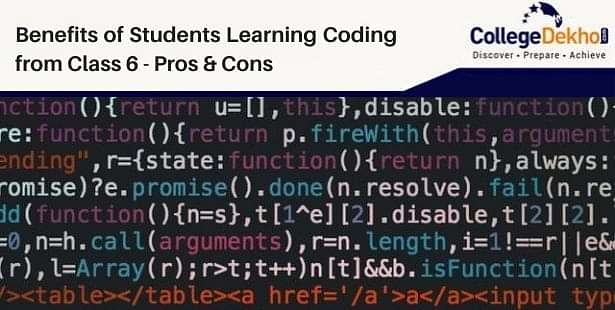The New Education Policy (NEP) has recently been introduced and the Education Ministry has introduced coding from class 6 as a 21st-century vocational skill. In this article, we dive deep into the topic and take a look at the pros and cons of introducing coding from class 6.

The New Education Policy (NEP) 2020 introduced by the newly-renamed Education Ministry has introduced many revolutionary changes in the education system of India. Students now have more control than ever on the subjects that they want to learn in school.
NEP 2020 has received mostly positive reactions from people in the education sector. It is hoped that the changes will provide a much-required positive push to the education sector and address many issues that affect education today.
One of the most talked-about changes in the New Education Policy (NEP) is the introduction of Coding from Class 6. This move has received widespread support from the present generation of educators with many terming it their favourite part of the policy.
| Table of Contents |
|---|
In this article, we explore why this is considered to be such a great move and why is it being singled out as one of the best changes introduced in NEP 2020.
Schools to Teach Coding from Cass 6
One of the reforms introduced in the final draft of NEP 2020 is that students will now be taught 21st-century skills from Class 6. Coding is one of the subjects that is a part of these 21st-century skills and students will have the option to choose coding as a subject from Class 6.
The announcement was made by Anita Karwal, the School Education Secretary and has been welcomed by educationalists throughout the country. Twitter has also been actively supporting this move made by the Education Ministry.
But, why is that? Why is coding being taught from class 6 such as big step forward? Is it a step in the right direction or just a gimmick? Will starting coding education from class 6 help the students or just increase their burden?
Also Read: New Education Policy: School Examinations to Be Removed by 2021?
Why Has NEP Introduced Coding from Class 6?
The world of today is a digital world in which a large portion of revenue generation by companies is being done not through their physical products but their digital services. An increasing number of companies are shifting towards online platforms to do their businesses. Mobile phones have become our means of travelling and mobile phone apps have become our window to the world.
Apps and websites are now used for innumerable purposes which include keeping in touch with your loved ones, learning and education, games, shopping, training, delivery of services etc. Plus, the use of digital tools and AI is becoming more common by the day in the workplace.
" As per The Future of Jobs Report published by the World Economic Forum (WEF) in 2019, 65% of the children entering primary school right now will be working in jobs that don't even exist right now. "
Take a look at the jobs that are common today and compare it to 10 years earlier and you will find that many people either hadn't even have heard of such jobs or they simply did not exist. The world is moving forward at an unimaginably fast face and it is important to equip children with the knowledge and skills that will help them succeed in the future.
It is almost impossible to overstate the importance of coding in today's world. Almost every human being that exists right now has been influenced by some form of coding or the other. In such a world where code is omnipresent, many have talked about why learning to code is important and beneficial for every person. Hence, introducing coding to children at an early age can have a lot of benefits.
Benefits of Students Learning Coding From Class 6
Here are some of the benefits that students will have by learning to code from Class 6.
They will be ready for a future that relies heavily on digital tools for all of its tasks.
It will make their education future-proof and give them better prospects at finding a job in a digital world.
As AI is introduced in more places, it will be used to automate and increase the efficiency and speed of many manual tasks. Students who are adept at coding will help in revolutionising the change through this technology.
Even if a student does not choose coding as their primary career, having its knowledge can still benefit them in any of their chosen industry.
Coding helps develop an analytical mindset, problem-solving attitude and creativity in children. It has a good effect on developing brains.
Teaching coding from Class 6 will help India develop better engineers who will bring in new ideas and solutions that we haven't even heard of.
Students with a knowledge of coding will find it easier to be familiar with new technologies and hence will be able to better ensure their employability in a fast-paced world.
Also Read: New Education Policy will Make India a Knowledge Super Power: President Kovind
Disadvantages of Introducing Coding from Class 6
There cannot be said to be any major foreseeable disadvantages of learning to code form class 6. However, many people have pointed out that introducing coding at a very early age such as class 6 must be done carefully as it can have several disadvantages.
Learning to code is not a requirement for a person to operate a computer well. Hence, it will be essential to not overstate the importance of coding for the next-gen workforce otherwise instead of becoming a fruitful venture, this will again become a rat-race.
Already concerns are being raised about the amount of time today's children are spending with technology. Educators and parents will have to work together to ensure that this does not have an impact on the time children spend interacting, playing and bonding with friends and family in the real world.
Many countries that have seen a digital revolution are facing an issue of their youth losing touch with reality and becoming workaholics. India will also have to find a solution to stop its workforce from becoming a mere cog in the machine and instead make help them become valuable contributors taking the country forward.
Coding can be a difficult subject and seeing its potential benefits, many parents might feel inclined to push their children towards learning to code. The educators will have to ensure that they design the curriculum to be fun, engaging and creative in order to develop the intended qualities in children instead of just focusing on rote learning and writing programmes.
While this cannot be strictly termed as a disadvantage, some have pointed out that it is yet to be seen what, if any, impact these next-generation coders will have on the employability of current-gen engineers.
Many of the disadvantages that have been discussed about the introduction of coding at an early age have been when it has been made mandatory. Since that is not the case here and students are free to choose their subject, it has become much easier to see that the benefits of this move far outweigh the demerits.
Also Read: New Education Policy: M.Phil to be Discontinued
Please note that the opinions stated above are partly the opinions of the author and partly come from public-opinion about the move. The implications of this policy are still unknown. However, it addresses several key handicaps of the current education system. Students, as well as teachers, have welcomed NEP 2020 with open arms and hope for a better future ahead for education in India.
What are your thoughts on coding being introduced from Class 6? Please feel free to share your opinions with us on the New Education Policy 2020.
Are you feeling lost and unsure about what career path to take after completing 12th standard?
Say goodbye to confusion and hello to a bright future!

Was this article helpful?


















Similar Articles
CBSE Class 9 Social Science Half Yearly Exam 2025 Most Important Topics
List of 21 Blacklisted Fake Universities in India 2025 by UGC (New List)
CBSE vs ICSE Board - Find the Difference and Know the Best Board
How to Score 95+ in Class 12? - Tips to Score 95% in 12th Exams
JENPAS UG 2025 Ranking Methodology
How To Score 95 Percent In Class 10? - Check Subject-Wise Tips to Score 95% in 10th